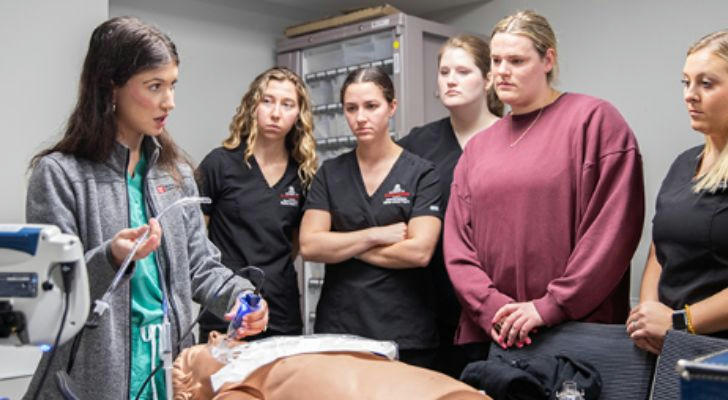Advance Your Nursing Career with CRNA Training: High Pay, Great Benefits & Stable Demand
🚑 Advance Your Nursing Career with CRNA Training! 💉💼
Are you a registered nurse looking for a high-paying, stable, and rewarding career upgrade? Becoming a Certified Registered Nurse Anesthetist (CRNA) could be your perfect opportunity! With salaries exceeding $200,000 per year, excellent benefits, and a growing demand for anesthesia professionals, this career path is both financially and professionally fulfilling. 💰✨
Even better, some programs offer accelerated 4-week certifications, allowing you to earn a government-issued certificate and secure employment immediately. ⏳🏥

Why Choose CRNA Training? 🎓🩺
The role of a CRNA is essential in the healthcare system, especially given the increasing demand for anesthesia professionals. Here’s why choosing CRNA training is an excellent career move:
1. Lucrative Salaries 💸
CRNAs are among the highest-paid professionals in the nursing field. According to the Bureau of Labor Statistics (BLS), the median annual wage for CRNAs was over $200,000 in 2023. This is significantly higher than many other nursing specialties, making it a financially rewarding career.
A CRNA's salary can vary depending on factors such as location, experience, and the specific healthcare facility, but with the growing demand for anesthesia professionals, salaries are expected to continue rising.
2. Comprehensive Benefits 🏥
Many hospitals and healthcare systems offer comprehensive benefits packages to their CRNA employees, including health, dental, and vision insurance, as well as retirement plans. According to a 2023 survey by the American Association of Nurse Anesthetists (AANA), approximately 90% of CRNAs report receiving health benefits as part of their employment.
Additionally, CRNAs often enjoy flexible schedules, paid time off, and the ability to work in a variety of settings, from hospitals to outpatient surgical centers.
3. Job Stability 📈
The demand for CRNAs is projected to increase in the coming years, driven by several factors:
The aging population, which requires more surgeries and medical procedures.
The increasing complexity of anesthesia procedures, requiring highly trained professionals.
The growing emphasis on cost-effective anesthesia delivery, where CRNAs play a vital role.
According to the U.S. Department of Health and Human Services, the demand for CRNAs is expected to grow by 15% over the next decade, which is faster than the average for most healthcare professions.
4. Loan Forgiveness & Tuition Reimbursement 🎓💳
Many CRNA programs, especially those affiliated with hospitals, offer loan forgiveness or tuition reimbursement programs to help reduce the financial burden of education. Programs like NHSC Loan Repayment help reduce educational costs by providing financial assistance to healthcare professionals who work in underserved areas.
Additionally, many hospitals and healthcare organizations offer employer-sponsored tuition reimbursement, which can help nurses pay for CRNA training. These programs are designed to incentivize nurses to advance their careers while alleviating the financial strain of advanced education.
5. Fast-Track Certification ⏳🚀
Some CRNA training programs offer accelerated 4-week certifications, which can be a great option for those looking to enter the workforce quickly. These programs provide a government-issued certificate and allow students to start working immediately after completing the certification.
While these fast-track programs are intensive and require full-time commitment, they offer a faster return on investment, allowing nurses to begin their careers as CRNAs much sooner than in traditional programs.
What You’ll Learn in a CRNA Program 📖
CRNA training is rigorous and includes both theoretical coursework and practical clinical experience. Here is an in-depth look at the key areas covered in a CRNA program:
1. Advanced Physiology & Pathophysiology 🧠
One of the most critical aspects of CRNA training is the study of advanced physiology and pathophysiology. Understanding how anesthesia interacts with different body systems is crucial for providing safe and effective care.
This course includes an in-depth study of the cardiovascular, respiratory, and nervous systems. CRNAs must understand how anesthetic agents impact the body’s organs and tissues, as well as how to manage patients with complex medical conditions.
2. Pharmacology of Anesthetics 💉
CRNAs must have a thorough understanding of anesthetic pharmacology, including the various classes of anesthetic drugs, their mechanisms of action, and their potential side effects. This knowledge is essential for administering anesthesia safely and effectively.
Students also learn about drug interactions, emergency protocols, and how to tailor anesthesia to individual patients based on their medical history.
3. Anesthesia Equipment & Technology ⚙️
A significant portion of CRNA training focuses on anesthesia equipment and technology. Students receive hands-on training with state-of-the-art anesthesia machines, monitoring systems, and infusion pumps.
Understanding how to operate and troubleshoot anesthesia equipment is vital for ensuring patient safety during surgical procedures. CRNAs are also trained to assess vital signs and adjust equipment to meet the needs of patients during anesthesia.
4. Clinical Anesthesia Practice 🏥
The clinical component of CRNA training provides real-world experience in anesthesia administration. Students work in hospitals and surgical centers under the supervision of experienced CRNAs and anesthesiologists.
During this phase, students gain practical experience in pre-operative assessments, administering anesthesia agents, monitoring patients during surgery, and managing post-operative recovery.
5. Pain Management Techniques 🛌
Pain management is another crucial area of CRNA training. CRNAs are often involved in managing both acute and chronic pain. Students learn various techniques, including regional anesthesia, nerve blocks, and epidural anesthesia, to provide effective pain relief for patients.
CRNAs also learn to assess pain levels, adjust pain management strategies, and collaborate with other healthcare providers to optimize pain relief.
6. Professional Ethics & Leadership 📜
CRNAs are leaders in the healthcare field, and their training includes a focus on professional ethics and leadership. Students are taught to make sound ethical decisions in clinical settings, communicate effectively with patients and teams, and manage patient care in high-pressure situations.
7. Research & Evidence-Based Practice 🔬
In addition to clinical training, CRNA programs often include coursework on research methodologies and evidence-based practice. Students learn how to critically evaluate research studies and apply the latest evidence to their clinical decision-making processes.

Top 5 CRNA Programs Offering Financial Aid 🎓💰
Several prestigious institutions offer high-quality CRNA training with financial assistance. Here are five leading programs:
1️⃣ University of Pittsburgh School of Nursing 🏥
Tuition: $50,000/year (scholarships available)
Perks: Tuition reimbursement through hospital partnerships.
Deadline: Rolling admissions
2️⃣ Duke University School of Nursing 🏛️
Tuition: $48,000/year
Perks: Loan forgiveness, strong clinical placements.
Post-Grad Salary: $220,000 average
3️⃣ Rush University College of Nursing 🚑
Tuition: $42,000/year
Perks: NHSC loan repayment eligibility, top job placement network.
4️⃣ Uniformed Services University of the Health Sciences 🎖️
Tuition: Fully covered for military personnel; stipend included.
Commitment: Service obligation required post-graduation.
5️⃣ Wake Forest School of Medicine Nurse Anesthesia Program 🌟
Tuition: $40,000/year
Perks: Tuition discounts, flexible clinical rotations.

Real Success Stories from CRNA Graduates 🎉
🌟 Emily’s Journey to Financial Freedom 💰 – Emily, an ICU nurse, used an employer-sponsored tuition reimbursement program to graduate debt-free. She now earns $210,000 annually at a top hospital.
🌟 James’ Career Transformation 🚀 – James leveraged the NHSC loan forgiveness program to eliminate $120,000 in student debt and now enjoys a six-figure salary with flexible hours.
🌟 Maria’s Work-Life Balance Success 🏡 – Maria, a single mother, chose Wake Forest’s CRNA program, which offered flexible rotations. She now earns $200,000 per year with comprehensive childcare benefits.

How to Apply for a CRNA Program? 🚀📜
📌 Research Accredited Programs – Ensure the program is COA-accredited (Council on Accreditation of Nurse Anesthesia Educational Programs).
📌 Meet Prerequisites – Typically requires a BSN degree and 1+ year of critical care experience.
📌 Prepare for Entrance Exams – Some schools require the GRE or other standardized tests.
📌 Secure Financial Aid & Scholarships – Explore NHSC loan forgiveness, employer tuition reimbursement, and grants.
📌 Apply Early – Many CRNA programs have limited spots, so early applications increase acceptance chances.
Final Thoughts: A Career Worth the Investment 🎯🏆
💉 CRNA training is an investment in your future, offering financial stability, job security, and incredible benefits. With numerous scholarships, tuition reimbursement, and government loan forgiveness programs, the dream of becoming a CRNA is more achievable than ever.
🔹 Some programs take just 4 weeks to complete, allowing you to obtain certification and start working immediately.
🎯 Ready to elevate your nursing career? Start your CRNA journey today! 🚀
